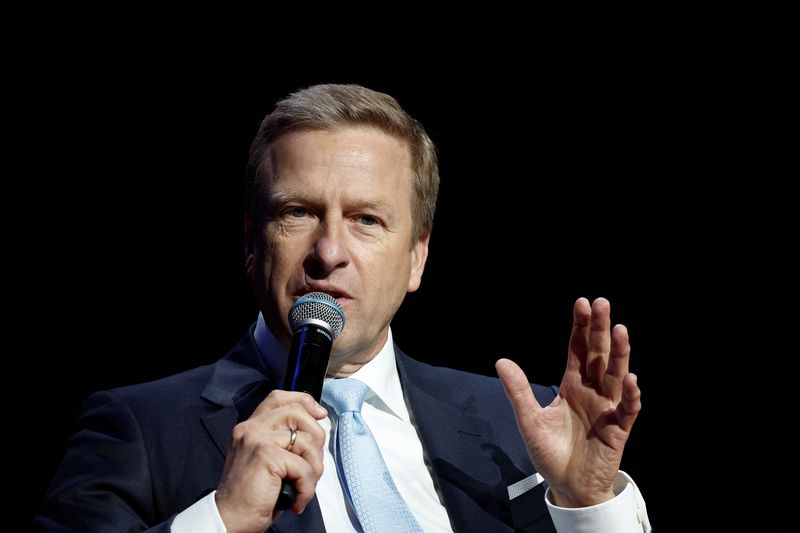By Christoph Steitz
FRANKFURT (Reuters) -Potential import tariffs under the U.S. presidency of Donald Trump may benefit BMW (ETR:BMWG), its CEO said on Wednesday, even as shares in the German premium carmaker and its rivals plummeted due to concerns the sector would be hurt by escalating trade disputes.
Fears over import tariffs, which Trump has threatened on goods from the EU, caused shares in BMW, Volkswagen (ETR:VOWG_p), Mercedes-Benz (OTC:MBGAF) and Porsche to fall 5.2-7.7%, among the biggest decliners across Europe.
BMW’s stock hit a four-year low, also driven by weak third-quarter results, while shares in Porsche – which has no production facilities in the U.S. – hit their lowest level since its initial public offering in September 2022.
BMW CEO Oliver Zipse sought to allay fears after presenting bleak third-quarter results, pointing to the company’s strong local footprint that includes its largest plant worldwide.
The U.S. market accounted for 12.9% of the 3.1 million in German passenger car exports in 2023, making it the single-biggest export market for carmakers in Europe’s biggest economy.
Goldman Sachs reckons that if the U.S. were to increase tariffs by 7.5-17.5%, “we see the largest headwind to EBIT at Volvo (OTC:VLVLY) Cars, followed by Mercedes, Porsche, BMW and VW”.
BMW’s plant in Spartanburg, South Carolina, produces more than 1,500 vehicles a day, making it the company’s biggest factory worldwide and a main exporter to markets including Germany, China and Britain.
LARGE FOOTPRINT
Zipse, speaking to journalists after presenting third-quarter results, said BMW may even have “more of an advantage” if there were tariffs “because we have a very, very large footprint in the USA”.
“In this respect, we shouldn’t be too nervous about what might happen,” Zipse said, adding BMW was present at 30 locations across 12 U.S. states.
He said that two-thirds of BMW’s vehicle sales in the U.S. were produced in Spartanburg, and that BMW was committed to investing further in the site with its more than 11,000 employees.
In the first nine months of 2024, BMW’s deliveries in the United States were down 2.1% at 271,399 vehicles.
The Spartanburg plant alone produced 410,793 vehicles in 2023, of which more than half were exported to 120 countries, leaving ample room for BMW to sell more locally should tariffs be slapped on vehicle imports.
“There’s some natural cover-up against possible tariffs,” Zipse said.
Mercedes-Benz has two production plants in the U.S. – in Tuscaloosa, Alabama; and Charleston, South Carolina – which between them produced 346,600 vehicles last year, around 14% of the automaker’s total sales. About two-thirds of the Tuscaloosa plant’s output is exported.
Volkswagen’s plant in Chattanooga, Tennessee, produced around 175,000 vehicles in 2023.

